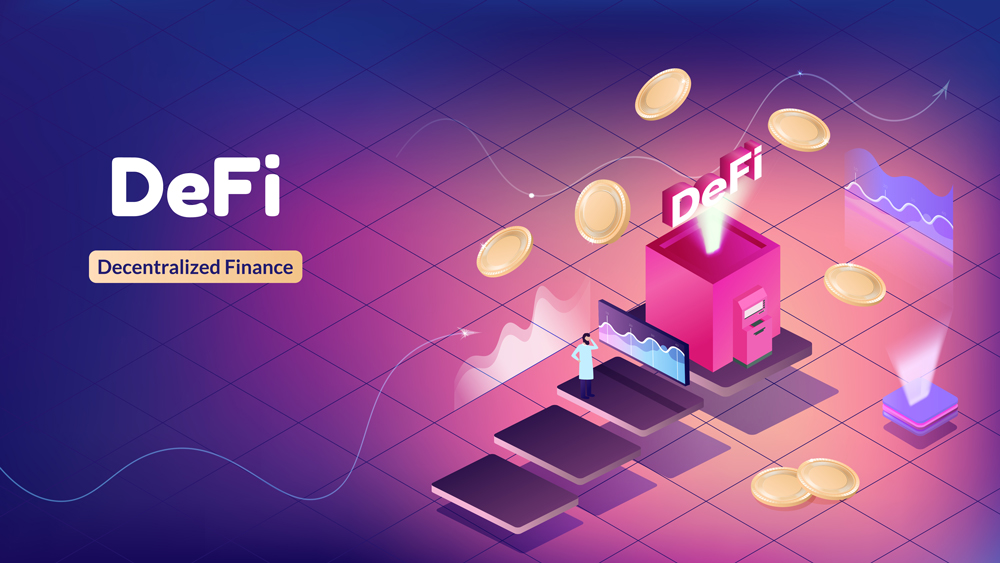News & Insights
Explosive Growth in Decentralized Finance (DeFi)
Explosive Growth in Decentralized Finance (DeFi)

The world of finance is changing. Banks were the gatekeepers to financial services in the past, but now a new breed of financial service providers is emerging – decentralized finance providers (DeFi).
DeFi comprises a collection of protocols and applications that allow users to create and use financial products without traditional intermediaries. We look at some key players in this space and see how they fuel explosive growth in DeFi.
- DeFi, decentralized finance, is a new financial management powered by blockchain technology. With DeFi, there is no need for centralized financial institutions such as banks or governments. Instead, individuals can interact directly with each other through decentralized applications or dApps. This allows for more transparent and efficient financial transactions and greater security and privacy.
- DeFi is still in its early stages but is already multiplying. This is partly due to the increasing popularity of Ethereum, the leading blockchain platform for DeFi applications. In addition, the recent economic downturn has made many people seek alternative financial solutions that are not subject to the same risks as traditional investments. As a result, DeFi represents a promising new direction for the financial sector.
What is DeFi, and why is it increasing?
- Decentralized finance, or "DeFi," is a term that describes the shift from traditional, centralized financial systems to peer-to-peer finance enabled by decentralized technologies built on the Ethereum blockchain.
- DeFi applications are open source and permissionless, meaning anyone can use them without needing to go through a centralized entity. This gives users more control over their financial data and allows them to interact with a broader range of financial products and services.
- DeFi applications also tend to be more transparent than traditional financial services, providing users with greater visibility into how their money is being used and how it is performing.
- Moreover, because DeFi applications are built on Ethereum, they can use Ethereum's smart contract functionality to automate financial transactions and negotiations. This significantly reduces the costs and risks associated with traditional finance methods.
- Overall, DeFi offers several advantages over traditional finance, making it an attractive option for those looking for more control over their finances.
How does DeFi work, and what are the benefits over traditional finance methods?

- Decentralized finance, or "DeFi," is a catch-all term for financial applications built on Ethereum and other decentralized platforms. From lending and borrowing platforms to stablecoins and tokenized Bitcoin (BTC), the DeFi ecosystem has increased in recent years.
- While the impact of DeFi on traditional finance has been relatively limited so far, the potential for disruption is significant. DeFi offers a more open and accessible alternative to many traditional financial services. Because it is built on Ethereum, anyone with an Internet connection can use DeFi applications.
- In addition, DeFi applications are often much cheaper to use than their traditional counterparts, thanks to lower fees and the elimination of intermediaries.
How will DeFi impact traditional finance in the future?
- As the DeFi ecosystem continues to grow and mature, it will likely have an increasingly profound impact on traditional finance.
- Ultimately, DeFi could lead to a more decentralized, open, and accessible financial system that works for everyone, not just institutions and the wealthy.
Final Thought
Popular Posts
- Blockchain Istanbul Summit
- - The Blockchain Economy Istanbul Summit
- China Shifts Focus to Blockchain
- - As blockchain technology continues
- Bitcoin Taproot Upgrade
- - Bitcoin is one of the most popular
- Growth in Decentralized Finance
- - DeFi comprises a collection of
- Facebook Enters the Cryptocurrency
- - Facebook has announced the launch of
- End of the Bear
- - A There's been a lot of speculation
